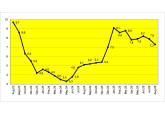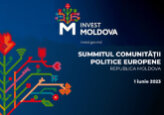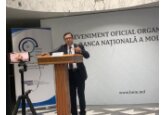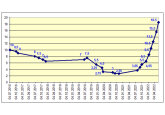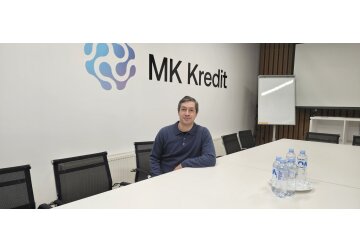
Petru DELINSCHI: The presence of companies from various economic sectors among the shareholders of the International Exchange expands investment opportunities
In mid-October, the Cabinet approved the creation of the “Moldova International Exchange” (BIM) with an initial authorized capital of about 30 million lei (1.5 million euros). Its shareholders are: Bucharest Stock Exchange (BVB) – 26.67%, the Moldovan Public Property Agency – 20%, maib – 10%, Donaris VIG – 11.67%, Grawe Carat Asigurări – 10%, Moldindconbank – 6.67%, MK Kredit Company – 5%, OTP Bank Moldova, Moldcell, and Premier Energy – 3.33% each. Although the word “stock” is missing from the name, the aim is to create a modern, transparent, and competitive capital market in the country.
In addition to the “locomotive” - BVB, with the support of the state, three commercial banks (out of 10 operating ones), two insurance companies (out of 9 with a valid license), one telecommunications operator (out of three operating ones), one energy company (out of 79 registered ones) and one non-bank credit organization (NBCO) (out of 108) invested in BIM.
The InfoMarket Agency Editor met with Petru Delinschi, Executive Director of MK Kredit Company, which invested 1.5 million lei in BIM's authorized capital, to find out:
InfoMarket: Why should NBCOs participate in the creation of a new stock exchange?
Petru DELINSCHI: As you know, the idea to create BIM came from the government, which invited a wide range of companies from different sectors of the economy to become its shareholders. This opportunity was offered to hundreds of companies, all of which were interested in one way or another in the development of the capital market in Moldova. We were attracted by the participation of the Bucharest Stock Exchange in the project, which brings its experience and technologies, including new opportunities for both legal entities and individuals to participate in trading.
Unfortunately, Moldova Stock Exchange, which has been operating since 1996, currently lacks many modern technical capabilities, although I know that its shareholders have been trying to modernize it over the past few years.
At the same time, Moldova is in dire need of capital market development. This is especially true when you consider how much money is leaving the country, where there are more investment opportunities, and our country is losing this money. At the same time, we are forced to borrow abroad. An active stock market makes it possible to attract investors to the country, not only retaining domestic capital, but also attracting foreign capital.
InfoMarket: It is known that the authorized capital of 30 million lei is only the beginning, and BIM will most likely require new investments. Do you plan to increase your share or keep your 5%?
Petru DELINSCHI: At the moment, we do not see the need to invest more. And I do not think it is right for an NBCO to have a large stake in the exchange. We are interested in supporting the project so that we finally have an active stock market.
In addition, the first 6-9 months are the time needed to establish the exchange, obtain a license, build a team, set up IT solutions, and perhaps change the regulatory framework at the level of the National Financial Market Commission or even change the legislation. When the exchange starts operating and increases its capital, I think other shareholders will appear. For example, I am pleased with the current composition of BIM shareholders, which includes companies from various sectors of the economy: telecommunications, energy, and, especially, insurance. This expands investment opportunities.
InfoMarket: Will it be possible to conduct primary or secondary placements of shares, say, from the banking sector, through this exchange?
Petru DELINSCHI: I am not sure that this will be possible within the next three years. However, the creation of a domestic exchange does not preclude the possibility for joint-stock companies to conduct IPOs on other markets.
InfoMarket: Let's take this opportunity to talk about the company and the non-bank credit organization market. This summer, you rebranded Mikro Kapital Moldova as MK Kredit Company.
Petru DELINSCHI: This is a rebranding of the entire MK Global Kapital Group—all 12 countries where its subsidiaries operate have done so this year. Starting with the parent company in Luxembourg, MK Kapital Management. The old logo featured the Italian flag – the country where the Group began its operations. Now that it has expanded, we have moved away from the previous colors, broadened the meaning of the name, and now we have an international brand.
InfoMarket: Having started operations in Moldova in 2013, in 10 years you have entered the top 10 NBCOs in Moldova in terms of overall performance. While 10 years ago there were over 180 NBCOs in the country, now there are 108, of which perhaps 20 are the most active.
Petru DELINSCHI: In fact, in terms of lending to legal entities, which is our focus, we are probably in the top 3. Many NBCOs focus on individuals and leasing. We lend to individuals within 5-10% of our portfolio. We do not engage in leasing because we believe that the number of cars in the country is not increasing significantly, and the leasing segment is too costly to enter at this time. There is very low demand for equipment leasing. Our employees in 10 branches across the country work mainly with micro and small businesses.
As for the number of companies in the market, I believe that their number has declined sharply since 2013, when the National Bank of Moldova made it mandatory to indicate the effective annual interest rate (EAR) and subsequently determined that the amount of interest charged cannot exceed the principal amount of the loan. Those who issued loans at even 500-1000% per annum are now limited in the size of the rate. They probably lost interest in working in this market, or they were unable to adapt to the new requirements for work and reporting.
InfoMarket: How dense is the NBCO market in Moldova, in your opinion?
Petru DELINSCHI: I would divide it into three categories. The first category - the individuals. This market competes directly with banks, with similar rates, conditions, and processes.
The second category is small businesses that are just starting up, even start-ups. On the one hand, these borrowers are still individuals, but on the other hand, they already have some projects and even income from entrepreneurial activities. This category is the riskiest. It is practically impossible for this category to obtain financing from a bank for a variety of reasons. Therefore, this niche is occupied by non-profit organizations, which share the risks with the borrower at the cost of higher interest rates.
The third category is agriculture. These are small or micro businesses that are already established. However, they lack collateral, or the price of collateral is greatly undervalued by banks, and the borrower does not agree with the assessment. Or they disagree with the fact that the bank may require additional collateral in the form of a residential house, farm, or even the income of a spouse, which many do not agree with. Then this is our client. We evaluate their project and take the risk together with the entrepreneur.
InfoMarket: What is your share of non-repayment or late repayment?
Petru DELINSCHI: This year, no more than 10%, especially in agriculture, which has not emerged from the crisis in the last three seasons. But I think that next year we will be able to reduce this figure to a relative norm of 3-4%; there are good prerequisites for this.
InfoMarket: How do you see the non-bank lending market, say, in the next year or three? Will banks take over this segment?
Petru DELINSCHI: Whatever people say, this niche is not going anywhere. This is because not all clients initially, especially when they are just starting their business, meet the criteria that banks impose on their borrowers. Banks do not want to, and sometimes cannot, take on high risks. The NBCO market takes them on, and yes, that is why the rates are slightly higher than those of banks. But they would be lower if it weren't for the war in the neighboring country. It has done Moldova a great disservice, because of all the countries bordering Ukraine, we have the highest country risk. Since the start of the war, there have been virtually no new investments in Moldova, except for institutional investors. And this applies not only to the financial sector. And what is attracted is at very high interest rates: in the absence of war, the cost of external resources attracted to the Moldovan market would be at least 8 percentage points lower.
At the same time, when discussing the situation with external partners, we see that after the elections they have become more open, saying that they can already plan projects for up to 3 years. They have begun to show slightly more interest in Moldova than, for example, at the beginning of the year. For us, a very important factor is the price of resources: the lower they are, the better the conditions we can offer to borrowers, and the greater the opportunities for economic development at the micro, small, and medium business levels. //03.11.2025 - InfoMarket.


